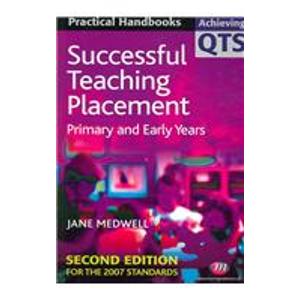
As promised, here is a review of Jane Medwell’s ‘Successful Teaching Placement: Primary and Early Years’. This is the 2nd edition of the book which I bought on eBay. It was listed as ‘New’ and it definitely hadn’t been used before. The books discuses how to prepare for your teaching placements and make the most out of school-based experience. There is plenty of advice and suggestions to help trainees to:
- Gather and analyse key information about the school and class
- Observe, plan and evaluate lessons
- Gradually widen your role within the school
- Deal with key assessment experiences, including target setting, levelling work and record keeping
- Understand the role of your mentor and manage your personal assessment
- Cope with challenges such as working with others, behaviour and child protection issues
- Review progress and maximise the benefits of your placement moving forward
I read this book whilst on the bus to and from work and I got through it quite quickly. I missed a few sections which aren’t relevant right now but I can honestly say that I have learnt a lot and I feel a lot more prepared. This book tells you everything you need to and want to know about placement without feeling like an idiot! You’re not expected to know everything on the first day but this books tells you how to prepare and what is expected of you, your mentor, your placement and the school.
There are a number of handy links to help with professional development and a variety of practical tasks to undertake whilst on placement. There are also a few examples of forms (planning, assessment, out of school, observation, etc) which will definitely come in handy.
This book is fantastic and I would highly recommend it. The writing style is easy to understand and it is clear. There is no confusing, professional jargon to put readers off. Everything you need to know about having a successful teaching placement has been crammed into 149 pages – after reading it I think and hope that you and I will!
Rachel

